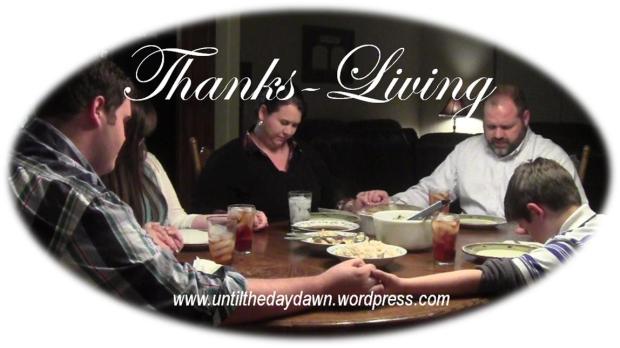 Ephesians chapter 5 tells the believer to have no fellowship with the unfruitful works of darkness, but rather expose them. It goes on to say wake up; redeem the time, because the days are evil. I believe a lot of Christian parents are beginning to wake up to the truths of public education. In the past decade the number of homeschooled children has increased by 62%. With the Supreme Court’s decision to legalize same-sex marriage nationwide, the force of Common Core, humanistic and atheistic teaching, and safety concerns across the nation, homeschool organizations are anticipating even further growth.
Ephesians chapter 5 tells the believer to have no fellowship with the unfruitful works of darkness, but rather expose them. It goes on to say wake up; redeem the time, because the days are evil. I believe a lot of Christian parents are beginning to wake up to the truths of public education. In the past decade the number of homeschooled children has increased by 62%. With the Supreme Court’s decision to legalize same-sex marriage nationwide, the force of Common Core, humanistic and atheistic teaching, and safety concerns across the nation, homeschool organizations are anticipating even further growth.
A few weeks ago I ran into a pastor who has been taking a stand on the LBGT within our local school board. He mentioned that he didn’t know what he and his wife were going to do about their children being in public school. He’s concerned, and rightly so. In light of society, I’m concerned for Christian parents who are not concerned.
There is a humanistic agenda within the system – from the top down. For years US Education Secretary Arne Duncan has been speaking out about this agenda. Then last week after the Supreme Court ruling on gay marriage the Department of Education flaunted its support by changing their Facebook profile page to the gay rainbow. And it is only going to get worse.
Because our government schools have become such a dark place I am so very thankful for our Christian teachers and leaders who are there being salt and light day in and day out. God bless each of them. They are fighting a battle right on the front lines. They need our support and prayers. But what about the Christian youth? Our innocent children? Shouldn’t they be salt and light in our public schools as well? My friend, Jonathan Lewis, one of the founders of Home School Enrichment Magazine has agreed to share his thoughts on this very issue.
Salt & Light
Taking a look at the #1 Christian argument against homeschooling
By Jonathan Lewis
Throughout the years of the modern homeschooling movement, a number of arguments have been raised against home education. Doubtless you’ve heard many of them. “How can an untrained mother teach her children? What about socialization? How are you going to teach higher math? How will your kids get into college?”
In Christian circles, there’s another argument that’s frequently brought up by parents who have opted to send their kids to public school. Perhaps you’ve heard it from parents in your church: “I’m sending my kids to public school to be salt and light,” they say. “If all the Christian kids leave the schools, who will reach the students left behind?”
This argument, because of its spiritual overtones and scriptural reference, often seems more difficult to answer than other arguments against homeschooling. After all, how can we argue against being salt and light? Wouldn’t that mean we don’t care about kids and teachers who don’t know Christ?
This argument has left many current or would-be homeschooling parents feeling torn and conflicted, unsure of how to weigh their responsibility toward their own children against their sense of responsibility to further the Great Commission—to reach the world with the gospel of Christ. Somehow it seems unchristian to leave the schools without a godly influence, and yet . . . should I risk my child’s spiritual well-being by sending him away to school? No wonder parents are feeling torn!
Is there an answer to this argument? Can Scripture be used to justify sending our children to public school? Should we send our children out as missionaries, or should we keep them at home? What is the scriptural answer to this conflicting sense of responsibility parents are feeling?
The Source of the Argument
The salt and light argument finds its source in Matthew 5:13–16, where Jesus tells His disciples that they are the “salt of the earth” and the “light of the world,” and that they should let their light “so shine before men, that they may see your good works, and glorify your Father which is in heaven.”
Thus, the argument says that Christian kids should attend public school to be a witness for Christ. They further argue that if all Christian kids are removed from the public schools, the students and teachers left behind will be stranded without a voice of truth or the opportunity to see a positive Christian witness.
First Things First
Before looking at possible responses, it’s important for us to realize something fundamental right from the beginning. The salt and light argument itself inherently acknowledges that our schools are largely godless. No one uses this argument to justify sending kids to a Christian school, because presumably the students there either already know Christ or at least have opportunity to hear about Him in ways other than through Christian students.
In other words, we only send missionaries where they’re needed—where there is a sufficient lack of truth and godly influence to give them room and opportunity to work. Thus, the argument itself acknowledges the largely godless condition of our public education system, and the parents who use this argument are as much as admitting that the overall environment at school is more or less hostile to the Christian faith. Some would attempt to maintain that the schools are not hostile to our faith, but are instead religiously neutral; this, however, is a difficult case to support, especially in view of Christ’s declaration in Matthew 12:30 that “He that is not with me is against me; and he that gathereth not with me scattereth abroad.” Christ doesn’t leave neutrality as an option.
In this context then, the salt and light argument assumes two things:
First, that the potential good a Christian student can do in the public school system outweighs the personal spiritual risk of sitting under humanistic teaching and spending hours every day in an admittedly ungodly environment.
Second, it assumes that being salt and light is a child’s top priority, as opposed to, for example, receiving a distinctively Christian education. In other words, it’s more important for children to be missionaries—while simultaneously receiving a humanistic education—than to be taught from a Christian worldview, protected from overtly negative peer influences, and so on.
With these basic presuppositions in mind, let’s progress now to looking at possible responses to this classic Christian argument against homeschooling.
The Context of “Salt and Light”
First, we should look at the context of the salt and light passage. Whom is Jesus speaking to? At the beginning of Matthew 5, we see clearly that Christ is speaking to His disciples. Verses 1–2 read, “And seeing the multitudes, he went up into a mountain: and when he was set, his disciples came unto him: and he opened his mouth, and taught them, saying . . . ”
As we can see, Jesus was speaking to a specific group of individuals: His disciples—adult men. Thus, in the original context, the salt and light passage was addressed to adults, not children.
That doesn’t mean children shouldn’t be a positive witness if and when they encounter those in the world around them. But it’s quite a leap from there to say that they should be deliberately placed in a spiritually hostile environment at young ages where they will be actively taught in ways contrary to the Word of God. Being salt and light is one thing. Sending our children to the training camp of the enemy is quite another—and we only need look around us to see the failure of this tactic.
We should also note that Christ’s disciples spent approximately three years with Jesus before He gave them the Great Commission and sent them out into all the world. In other words, they experienced three years of intense, hands-on training and preparation with the perfect, faultless, infallible Son of God before He deemed them ready to go out on their own. How much more preparation will our children need before they can stand on their own? After all, they have fallen, fallible, sinful parents responsible for their training—not the perfect Son of God in the flesh.
Looking further at the context, we see that Jesus was instructing His disciples to be salt and light while they were still in His presence, under His direct teaching and influence. Thus, we can see that it’s possible to fulfill this command even without being sent out alone, away from the protection and influence of one’s God-given teacher or mentor. If parents, biblically speaking, are the appropriate teachers and mentors of their children (more on this later), it’s possible for children to fulfill the salt and light mandate within that framework, rather than having to be sent away.
In view of these contextual considerations, it’s difficult to make the case that this passage directly applies to children in the way in which our critics suggest. Since it doesn’t specifically mention or command sending children to a spiritually hostile environment to be salt and light, it certainly doesn’t constitute the final word on the matter, and therefore we should look to other biblical passages and principles for more clarification.
Training Ground, Not Mission Field
One consideration which the proponents of the salt and light argument often seem to overlook is the reality that they are not simply sending their children to a mission field, but a training ground. In other words, these Christian kids are not being sent out to reach other students and teachers while being isolated from the humanistic teaching that occurs in the schools. The teaching is an unavoidable part of the package. Thus, in order to justify sending his or her child to public school as a missionary, a parent needs to simultaneously justify sending his or her child away to receive an education based on humanistic philosophy instead of one that is built on Scripture and a Christian worldview.
Those proponents of “salt and light” who do recognize the educational aspect of the situation apparently maintain the assumption that their children can withstand whatever humanistic teaching they will encounter and escape unscathed. In other words, they assume that their children can sit under hours of teaching from a perspective other than the Bible, surrounded by peer influences that tempt them in the wrong direction, and not be negatively influenced by any of it.
In addition to being dangerously naive, this view contradicts such Scriptures as Luke 6:40 (“The disciple is not above his master [teacher]: but every one that is perfect shall be as his master”), Proverbs 13:20 (“He that walketh with wise men shall be wise: but a companion of fools shall be destroyed”), and 1 Corinthians 15:33 (“Be not deceived: evil communications corrupt good manners”).
I would challenge anyone to search the Scriptures and find one verse advising parents to hand the teaching of their children over to those who don’t know God or uphold His truth. As Paul declares in 2 Corinthians 6:14, “Be ye not unequally yoked together with unbelievers: for what fellowship hath righteousness with unrighteousness? and what communion hath light with darkness?” And in verse 17, “Wherefore come out from among them, and be ye separate, saith the Lord.”
We are to be distinct from the world. There should be a separation between the world’s philosophies and methods and our own. We are not to mingle ourselves in their practices or partake in their way of life.
The command to not be unequally yoked with unbelievers is also worth noting. When Christian children are placed under the authority of unbelieving teachers, principals, and other school administrators, we would do well to ask if they are in fact unequally yoked. Certainly they often do not have the freedom to fully express their identity as followers of Christ; in that sense, they are “yoked” to those who do not share their faith, and their activity, at least in some measure, is dictated by unbelievers who are in authority over them.
Proverbs 1:7 says that “The fear of the Lord is the beginning of knowledge,” and Colossians 2:3 tells us that in Christ “are hid all the treasures of wisdom and knowledge.” In Proverbs 9:10 we again see that “The fear of the Lord is the beginning of wisdom: and the knowledge of the holy is understanding.”
It’s no small matter to give the education of our children to those who remove the foundation of wisdom and knowledge. Unless the proponents of “salt and light” can make a convincing scriptural case that it doesn’t matter if we allow our children to be taught from a worldview contrary to the Bible, we are already beginning to see major cracks in the foundation of their argument.
Peer Influences
Children—indeed, all of us—have a natural propensity to do wrong. That comes naturally to us. Doing right, on the other hand, is contrary to our natural inclinations and tendencies.
When children are sent to public school as “missionaries,” they are surrounded by other young people who, by and large, are following their natural desires, thus creating the negative peer pressure we so often discuss. And since our children have a natural propensity toward wrongdoing—even if they already have their own walk with the Lord—placing them amidst this negative peer pressure for hours every day is questionable at best.
We can examine Scripture to see what the Bible says about this.
We have already noted Proverbs 13:20 (“He that walketh with wise men shall be wise: but a companion of fools shall be destroyed”) and 1 Corinthians 15:33 (“Be not deceived: evil communications corrupt good manners”). Both of these passages give strong warning to those who would willingly and knowingly allow their children to be surrounded by negative peer influences.
The influences surrounding our kids make a difference. They’re going to be impacted. We all know that in a typical scenario, kids generally tend to pull each other down, not lift each other up. Let’s go back to Proverbs 13:20 for a moment: when we pair its warning to the companion of fools with Proverbs 22:15, which tells us that “foolishness is bound in the heart of a child,” it’s easy to see why extensive peer-based socialization can be so destructive. Foolishness is bound in the hearts of children, and the companion of fools will be destroyed. Is it any wonder that we so often see children and young people making destructive life choices as a result of peer pressure?
Children are impressionable. When they are sent out alone to confront the world and interact all day with those who have a different system of values, they are placed at high risk of adopting those different values. Scripture warns us of this, and it shouldn’t be surprising when we see it occurring around us.
Seasons of Purpose
Different seasons of life bring different opportunities, activities, and purposes. One helpful question to ask, as we examine the salt and light argument, is this: what is the purpose of childhood?
Is it to fulfill some kind of mission for the cause of Christ, or is it instead a season of preparation for later work and ministry?
Throughout the Bible, we find numerous commands and references to parents training and teaching their children (Deuteronomy 6:6–7, Deuteronomy 32:46, Proverbs 1:8, Isaiah 38:19, Joel 1:3, Ephesians 6:4). Put together, these passages form a consistent pattern throughout the whole of Scripture, emphasizing again and again the importance of parents raising their children in the ways of the Lord. The biblical model of education is always God-centered, faith-driven, and parent-directed.
At the same time, we see a profound lack of passages suggesting that children have a specific mission or calling to go outside the discipleship of their parents to reach the outside world.
Most of those who use the salt and light argument seem to assume either that their children don’t need any preparation to be missionaries in the schools, or that a few hours in church each week and perhaps a little time with Dad and Mom in the evening will be adequate to not only counteract the secular teaching in the schools, but also prepare them to be bold witnesses for Christ. And of course, children need preparation for the rest of life as well—not just their childhood years. In other words, it’s no small undertaking to raise a child in the nurture and admonition of the Lord.
The reality is that the preparation must be adequate to the task at hand. The greater the task, the greater the need for adequate preparation. And is there any greater task than sending out the next generation ready and equipped to do God’s work?
God lays out for us a model in Deuteronomy 6:6–7 when He instructs parents to teach their children His commands. “And these words, which I command thee this day, shall be in thine heart: and thou shalt teach them diligently unto thy children, and shalt talk of them when thou sittest in thine house, and when thou walkest by the way, and when thou liest down, and when thou risest up.”
In his article “The Christian Education Manifesto,” Israel Wayne observes of this passage, “This describes a 24/7/365 discipleship paradigm, centered on the commandments of God.”
Precisely. God apparently didn’t think an hour of Sunday School and a few minutes in the evening with Dad and Mom was adequate to prepare children to live righteous, holy lives. He commands parents here to teach their children with a diligence and constancy that most parents never come close to reaching.
We can gain more insight into this issue by considering the words of Christ Himself in relation to adults and children. Consider this contrast between two messages: Christ commanded His adult disciples to be salt and light, and sent them out to do His work. But what did He say of children? “But Jesus said, Suffer little children, and forbid them not, to come unto me: for of such is the kingdom of heaven” (Matthew 19:14). For adults, His word was “Go.” For children, His words were “Let them come.”
These words of Christ create a compelling picture and clearly illustrate the concept of different seasons of life. During the early, formative years, children are to be brought to Christ—taught about Him, nurtured in His ways, and discipled to live for Him. As adults, they are then able to go out and make a difference for Christ after that first season of preparation. Childhood is the time for coming, adulthood the time for going.
Right Priorities
As a parent, you must ask yourself, “What is my top priority? Is it to reach someone else’s children for Christ by placing my own children’s spiritual well-being at risk, or is it to raise my children in the ways of God, discipling them to the point that they are solid, well-grounded young adults who can stand on their own?”
God didn’t give you someone else’s children. He gave you your own. That doesn’t mean we should never seek to reach out to others, but it does suggest a hierarchy of priorities. Generally speaking, our top priorities are those that are closest to us. We find this principle illustrated for us in 1 Timothy 5:8 where Paul says, “But if any provide not for his own, and specially for those of his own house, he hath denied the faith, and is worse than an infidel.” When it comes to physical provision, a man’s immediate household is his top priority. Those closest to him should command his first attention.
Similarly, Paul stipulated that a man must be able to “rule his own house” (1 Timothy 3:4–5) in order to be considered for the position of bishop or deacon in the church. Thus, before a man’s ministry could expand to include one of these positions of leadership, he first had to show the capacity to lead in his own family. Here again we see the hierarchy of priorities: attention to your own family first, expanded ministry second.
We see the same principle in the Old Testament in Genesis 18:17–19 where God is about to destroy Sodom and Gomorrah and decides to share His plans with Abraham. In that passage we read, “And the Lord said, Shall I hide from Abraham that thing which I do; seeing that Abraham shall surely become a great and mighty nation, and all the nations of the earth shall be blessed in him? For I know him, that he will command his children and his household after him, and they shall keep the way of the Lord, to do justice and judgment; that the Lord may bring upon Abraham that which he hath spoken of him.”
Here we see that Abraham’s ability to raise and train his children was a key factor that brought greater confidence from God, and was apparently even a factor in God’s promises and blessings to him. Thus, we again see that proper attention to the closest priorities came before increased responsibility and opportunity outside.
None of this means that we shouldn’t reach out beyond our own families. I’m not saying your family should be your sole focus, but your first focus. Parents who use the salt and light argument, however, are essentially saying that the needs of students in the public schools come ahead of their own children’s need for a Christian education, the intensive discipleship of their parents, and appropriate protection from negative peer influences. Biblically speaking, however, parents should place the greater emphasis on their own children’s needs and only thereafter look beyond their family to the needs around them. That is the biblical order.
Wishful Thinking
We’ve already seen multiple reasons why the salt and light argument is contrary to biblical principles. We can also look outside Scripture to find an additional compelling reason why this argument doesn’t withstand scrutiny: generally speaking, the idea that children can be effective as salt and light in a hostile, secular environment is simply wishful thinking.
Lee Duncan, Dean of Administration for The Master’s College, wrote in his article “A Case for Christian High Education”:
Why would we expect Christian young people who are in their most impressionable time of growth to challenge mature teachers who will attack their faith? In reality, most Christian students in public schools challenge no one; they simply stay quiet and try to avoid any confrontation.
And in her article “Culture of Answers,” Jill Carattini of Ravi Zacharias International Ministries, wrote the following:
A recent study on the faith and belief of today’s youth laments the growing inarticulacy of students when it comes to talking about what they believe . . . The researchers were troubled as they realized how seldom teens found opportunity to practice talking about their faith. They were astonished by the number of kids who reported that this was the first time they had been asked by an adult what they believed. One replied as if he was caught off guard, “I don’t know. No one has ever asked me that before.” (emphasis in the original)
In other words, by and large, students aren’t talking about their faith at school. It’s not happening. And as Lee Duncan points out, why would we expect them to? Why would we expect them—at such an impressionable age—to draw attention to themselves and challenge those around them when in school the supreme virtue is to do as you’re told and not cause disruption?
Consider it in another way: if the salt and light argument were solid and Christian kids were really making a difference in their schools, why have we not seen a great spiritual awakening in our public education system? Why do we instead see our church pews increasingly empty as young people continue their mass exodus from the faith? It’s not our Christian youth who are winning the world, but the world who is winning our Christian youth.
Research indicates that up to 85 percent of young people from Christian homes who attend public school end up walking away from the church by the time they graduate high school. Many parents will insist that their kids are the exception—that they can handle the unbiblical worldview and negative peer pressure and remain true to their God and strong in their faith. But is that a chance we should take? Do we want to risk that our kids will be among the 15 percent instead of the 85 percent? Sure, we’d all like to think that our kids can stand strong—that they’ll defy the norms, beat the odds, and emerge victorious on the other side. But is that really rational?
Imagine yourself the unexpected owner of a ten-million-dollar inheritance. Your financial adviser gives you the opportunity to invest the money and earn enormous dividends, but the opportunity comes with a risk. “I have to tell you,” he says, “there’s an 85 percent chance you’ll lose every penny in this investment.” Then he smiles and says, “But there’s a 15 percent chance you’ll double your money and walk away with twenty million!”
What would you decide? My guess is that you’d turn it down with a flat no and tell your broker that someone would have to be crazy to take a risk like that. And you’d be right. Why would you risk such an incredible treasure when the odds are stacked so heavily against you?
Why should it be any different with our children? God has entrusted every parent with a treasure worth far more than ten million dollars—and we’re going to invest that treasure in a risky venture, hoping we’ll be in the 15 percent instead of the 85 percent? Not with my kids. The risk must be weighed, and with the stakes so high, shouldn’t a godly caution guide our steps?
The numbers for homeschooled students are radically different. According to Dr. Brian Ray’s 2003 report “Homeschooling Grows Up,” more than 90 percent of homeschool graduates report that their religious beliefs are essentially the same as their parents’, and more than 90 percent continue to attend church on a regular basis.
Why the difference? Because Christian home education and public school are as different as night and day. When we follow a radically different process, it’s predictable that we’ll end up with a radically different result. And that’s exactly what we’re seeing.
If “salt and light” were really working as well as its proponents wish, we wouldn’t have these unfortunate statistics. We’d have churches overflowing with crowds of young people brought in by our Christian kids who are in the schools. It’s not happening.
In discussing all of this, we should also heed Jesus’s strong denunciation of those who offend children who believe in Him: “But whoso shall offend one of these little ones which believe in me, it were better for him that a millstone were hanged about his neck, and that he were drowned in the depth of the sea” (Matthew 18:6).
Considering the rate at which children from Christian homes are leaving the church after attending public schools, we are forced to wonder if our school system is guilty of offending untold numbers of these “little ones” who believed in Him. And what of the parents who voluntarily send their children there when valid alternatives are available? My intention is not to be judgmental, but to help us to think about what we’re doing. The risk must be weighed, and again I ask: with the stakes so high, shouldn’t a godly caution guide our steps?
We would also do well to note that the very same verse that instructs us to be salt and light also warns us that if the salt loses its saltiness, it’s good for nothing but to be thrown in the streets and trampled underfoot. Thus, we have a command and a warning given together. The warning portion, however, seems largely overlooked by the salt and light proponents. The significance of the warning is intensified when we realize again that the large majority of children from Christian homes are in fact losing their saltiness in the public schools. If parents would pay as much heed to the warning as they do the command, their perspective might change.
Wrong Becomes Right?
One reason so many parents have difficulty answering the salt and light argument is because it appeals to Scripture. On the surface, it can look like a scriptural justification for sending Christian kids to public school. But there’s more to it than that.
We all know that we must use Scripture appropriately—that we shouldn’t take verses out of context, twist their meaning, or seek to use Scripture to justify something unscriptural. Wrong actions are still wrong actions, even if we can pull an isolated verse out of the Bible that seems to justify what we’re doing.
Let’s take an obvious example. God instructed Adam and Eve in Genesis 1:28 to “be fruitful, and multiply.” He gave Noah and his sons the same command in Genesis 9:1 and repeated it six verses later in Genesis 9:7. Additionally, Psalm 127:3–5 tells us that “Lo, children are an heritage of the Lord: and the fruit of the womb is his reward. As arrows are in the hand of a mighty man; so are children of the youth. Happy is the man that hath his quiver full of them.”
Thus, from these verses we see that it’s good and appropriate for us to desire children and to consider each child a blessing from God. Now, imagine you meet a man who is pursuing numerous immoral relationships outside of marriage and who uses these Scriptures as justification. Imagine he tells you, “The Bible says to be fruitful and multiply, and that children are a reward from God. I realized that I can have more children if I don’t limit myself to only one woman. I know some people would frown on what I’m doing, but I’m just trying follow the Bible’s command to multiply and get all of God’s blessings that I can.”
Would we say that what this man is doing is fine and good because he was able to give us a few Bible verses that appear, at a quick glance, to support his case? I hardly think so. Why? Is being fruitful and multiplying suddenly wrong? Are children not a blessing? Quite the contrary. Yet we would recognize this man’s profligate lifestyle as wrong and displeasing to God, even though he gave us some Bible verses. His motives (theoretically, at least) could be perfect: he desires the blessing of more children, consistent with the Bible’s teachings. Yet his actions are still wrong because they are contrary to the message of Scripture taken as a whole, which commands moral purity.
Trying to justify sending our children to a godless environment to be educated on the basis of “salt and light” is akin to the man justifying his immoral lifestyle on the basis of being fruitful and multiplying. In either case, a biblical reason is used to justify something that contradicts the overall thrust of scriptural teaching. I repeat: the biblical model for education is always God-centered, faith-driven, and parent-directed. Remove one of those elements, and you’ve fundamentally altered the model God has given us in Scripture.
Being salt and light isn’t wrong. Exactly the opposite. But that doesn’t mean that every possible idea we could think of to allow us to be salt and light is acceptable and good in the sight of God. The message of Scripture is clear: children are to be taught and nurtured in the ways of the Lord, not the ways of the world. If a particular approach to being salt and light violates this truth, then we must reject that approach as unscriptural. Our motives may be pure, but that doesn’t make our actions right.
In short, we can’t justify doing something wrong for a “good” reason. Sending our children to a godless environment for their training and education is wrong. Plain and simple. There is absolutely no biblical basis on which to say it’s fine. To justify it with the claim that our children can be salt and light is to say that wrong has become right because something good might come from the wrong action.
We’re in a Battle
Perhaps one of our problems is that we fail to see life as it really is—as a battleground between light and darkness, righteousness and unrighteousness, good and evil. If our goal is to simply raise children who can get a well-paying job and enjoy “the good life,” then we are likely to be far less concerned about how and what they are taught. But if we realize that our goal is to raise soldiers for Christ who can go out and make a difference in the world, the issue of our children’s training and preparation becomes far more important.
What army would send their troops to be trained in the camp of their greatest enemy? No, the people in the public schools aren’t our enemies. We don’t wrestle against flesh and blood, “but against principalities, against powers, against the rulers of the darkness of this world, against spiritual wickedness in high places” (Ephesians 6:12). We do have a spiritual foe, and he is alive and well in our secular educational system of today.
In the realm of nations and governments, we would consider it reckless beyond belief to send our troops to be trained by the enemy. In World War II, Winston Churchill would never have considered sending the troops of England to be trained by Hitler. In the days of the Cold War, America wouldn’t have sent her soldiers to be trained by the Communists. Yet that’s exactly what we’re doing when we send our children to be taught in schools where God is excluded and a biblical worldview is ignored. The next generation of Christian soldiers is being trained, but not in the right camp.
Whatever Remains
Sherlock Holmes, in The Sign of the Four, neatly summed up a simple reality: “When you have eliminated the impossible, whatever remains, however improbable, must be the truth.”
Some say we have no scriptural command to home educate—in other words, there’s no chapter and verse we can point to that says public or private school is wrong and that we must teach our children at home. However, I would contend that if all the biblical principles and passages that discuss the training of children consistently uphold one model, then all other approaches are excluded—if not explicitly, then by clear implication.
In other words, if God has instructed us that children should be taught in the fear of the Lord, then we don’t need a specific command telling us that they shouldn’t be taught without the fear of the Lord—we already know how they should be taught.
If God has commanded parents to be the diligent, day-in, day-out teachers of their children, then we don’t need an explicit command not to send kids away for hours every day to be taught by someone else—we already know who their teachers are supposed to be.
If God tells us that negative peer influences are destructive, we don’t need a command telling us to give appropriate protection to our children—we already know they should be protected.
Let’s illustrate it this way. If you were to tell your children, “Be nice to the kids next door,” you wouldn’t have to explicitly and specifically forbid all of the potentially unkind things your children could do. You don’t have to tell your son not to punch the neighbor boy in the nose. You don’t have to tell your kids not to steal the neighbors’ toys, make fun of them, throw rocks at them, or any number of things they could conceivably do. All of that is excluded with the single command, “Be nice to the kids next door.”
Similarly, when God told parents to teach their children diligently in His ways, He didn’t need to specifically outline all of the ways they shouldn’t be taught. All of that was taken care of by telling us how they should be taught.
What About the Success Stories?
There are those who will listen to all these arguments against the salt and light proposition and still maintain that children ought to be sent away to school as missionaries. In some cases, they may have seen (or even been) a Christian young person who successfully navigated the turbulent waters of the secular schools and emerged on the other side relatively unscathed. They maintained their Christian testimony, were outspoken for their faith, and perhaps even succeeded in winning classmates for Christ. These students may even argue that their experiences in a secular school strengthened them in their faith. Some then use this as justification that “salt and light” really does work after all.
Arguments from experience, however, should not be elevated to the level of Scripture. We have clear teaching from the Bible about how children should be taught. The general rule we’re seeing is that the faith of kids from Christian homes is being decimated in public school. If we encounter an occasional exception to this rule, that can hardly be considered justification for others following in their path.
If we look hard enough, we can find people willing to justify virtually anything based on their experience. There are those who argue, for example, that God led them to divorce their spouse—and that their life was better because of it—despite God’s clear declaration in Malachi 2 that He hates divorce and Jesus’s warning in Matthew 19:6 and Mark 10:9 that “What therefore God hath joined together, let not man put asunder.” We cannot argue against Scripture based on our experience. Just because we see someone else ignore the warning signs, jump in the alligator-infested river, and swim successfully to the other side doesn’t mean we should follow suit. Did someone else survive? Yes. Does that make it right for us—or, for that matter, even for them? No. We must heed the instruction of Scripture more than the voices of those who would tell us of their experiences.
Conclusion
The purpose of this article has not been to criticize or judge the motives of those who advance the salt and light argument, some of whom are sincere, godly Christian parents. Rather, my intent has been to provide a much-needed alternative perspective—one that looks at the issue not just in light of one or two Scripture verses, but that examines the overall message and thrust of the Bible as it relates to education and children.
The bottom line is this: the concept of voluntarily sending God’s children away—for any reason—to be educated in institutions where He is rejected, is utterly foreign to Scripture. If the God-centered, faith-driven, parent-directed model of education found in Scripture means anything at all, then the concept of subjecting children to secular, God-absent education is beyond any rational biblical justification. Search for a lifetime, and you will still fail to find the smallest piece of evidence that God approves of sending the children of His kingdom to the halls of humanistic learning.
It was Christ who declared that anyone who offends one of these little ones would be better off drowned in the depths of the sea. Would He now be in favor of education that leaves Him out? It was the apostle Paul who boldly asked, “What communion hath light with darkness?” and “What part hath he that believeth with an infidel?” Would he now stand up and say it doesn’t matter if the children of God are taught in darkness and educated by unbelievers?
Let’s make sure we’re taking care of our first priorities first. Let’s give our children a God-centered, parent-directed education as outlined in Scripture, and then, as God leads, we can reach out to others. Just because we’re homeschoolers doesn’t mean we can’t be salt and light. And our children will be more effective in God’s service for a lifetime if they don’t lose their saltiness in their youth.
Jonathan Lewis is a homeschool graduate, husband to Linnea, and daddy to Patrick, Timothy, and another on the way. He is one of the founders of Home School Enrichment Magazine and enjoys writing and speaking from his perspective as a homeschool graduate. If you would like to invite Jonathan to speak to your group—or to get in touch with him for any other reason—drop him a note at jonathan@HomeSchoolEnrichment.com.
Copyright 2015, Jonathan Lewis; reprinted with permission.







